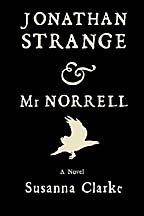
Jonathan Strange and Mr Norrell
Susanna Clarke
782 pages
published in 2004
Jonathan Strange and Mr Norrell is not only one of the best received debut novels of recent times, it is also that rare bird, a critically acclaimed fantasy novel accepted as "real" literature by the literati. It's published by Bloomsbury, not known for its fantasy line and though it sports a back cover blurb by Neil Gaiman, it also has one by Charles Palliser. Add reviews by such worthies as Michael Dirda and you know this isn't your typical fat fantasy, but is it any good?.
Oh yes.
I'm not sure I can agree with Neil Gaiman when he writes that this is "unquestionably the finest English novel of the fantastic written in the last seventy years" --if only because I'm not that well read in the genre-- but it is certainly in my top ten. It's well written, erudite, exciting and thoughtful, original yet standing firmly in the great English fantasy tradition. It is a book that on the one hand you rush to finish, on the other you slow down for to savour the writing.
But perhaps most important, it succeeds in the task that Tolkien set himself when he wrote Lord of the Rings: to create an English mythology. Tolkien's attempt, no matter its importance in shaping fantasy, failed in creating an English fantasy; in contrast, Jonathan Strange and Mr Norrell could not have been written by anybody but an English person and perhaps by nobody but a Northern English person. It has its roots firmly in English soil: Ireland, Wales nor Scotland get so much as a look in. Even when the stage moves outside the borders of England, its quintessential Englisness permeates the scene. It's an old-fashioned Englishness, neither the kitsch tweeness of a Morris dancer's assocation nor the agressive and insecure posturing of the football hooligan, from an era when to be English was to be automatically superior to any other creature.
It's not just the attitudes in the novel which makes it such an English novel; it's also the way in which Susanna Clarke roots her novel in English history, to such an extent that it would not surprise you to read that there was a Raven King who ruled over Northern England in the high Middle Ages. The footnotes liberally sprinkled throughout the book help with this, creating an atmosphere in which it becomes easy to believe that there was a Golden Age of English magic, which degenerated until by the early 19th century there were only theoretical magicians, gentlemen scholars, who study magic but do not practise it.
The third element in Jonathan Strange and Mr Norrell that makes this an English fantasy is the language. The book is set in Regency England and written as if it was published sometime in the early 1820s, just years after the events described. The language in which Susanna Clarke has written Jonathan Strange and Mr Norrell reflects this. She writes in a style clearly derived from contemporary novelists like Jane Austen, without slavishly imitating them. Her writing, her language and sense of style is in the style of the period, but thoroughly modern at heart. Moreover, she manages to give each character their own voice as well as make clear the differences in class, upbringing, including regional differences in language use.
Jonathan Strange and Mr Norrell is a novel one wants to finish quickly, to get to the denouncement, though at the same time, one would like to linger in it, as the writing is so good and the world it conjures is so interesting, one doesn't mind if the plot doesn't always progress as quickly as one would wish in a lesser book. It is a quality Jonathan Strange and Mr Norrell shares with Lord of the Rings.
Said plot --since I mentioned it I'd better explain it a bit-- revolves about the two magicians mentioned in the title, who appear in the book in the reverse order of the title. Mr Norrell is a taciturn northern gentleman, the sole practising magician in an age of theoretical magicians, who goes around buying up each magical book he can find, as well as putting out of practise any magician whose misfortune it is to cross his path. His mission is to revive English magic, but on a rational basis, without all this misbegotten nonsense about the Raven King and Fairies. He succeeds to such an extend that he is in service of the English government, but he becomes overshadowed by the second practising English magician, Jonathan Strange. Aa far more likeable character than mr. Norrell, more outgoing and more easy to get along with, yet Strange still becomes Norell's student and friend. Its their relationship that forms the core of the book's plot.
Interwoven with this relationship is a second, taking place in the background of Norrell's and Strange's adventures, the "friendship between Stephen Black, servant to Sir Walter Pole, one of Mr Norrell's first sponsors and the mysterieus gentleman with the thistledown hair, a very venerable gentleman, brought back to English shores thanks to one of mr Norrell's first big magic showpieces. Each has a role to play in the unfolding drama, a role that may have been predetermined.
As a pearl grows around a modest piece of grit in an oyster, so grows Jonathan Strange and Mr Norrell around this plot. For huge stretches of the book, one can forget there even is a plot. As with the best of fantasy, it's the world that's portrayed in Jonathan Strange and Mr Norrell that is the main interest. This is not a book one can to grips with in just one reading; it needs rereading to fully digest; the best kind of book.
